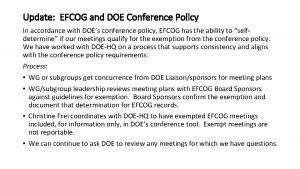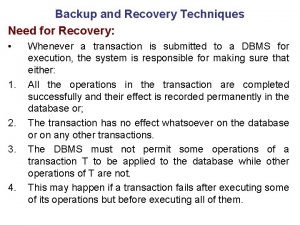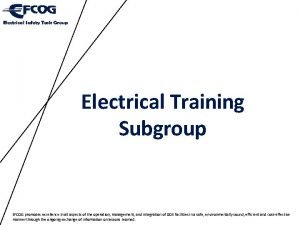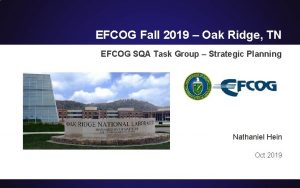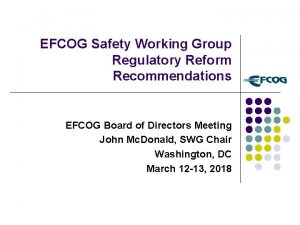Update EFCOG and DOE Conference Policy In accordance




- Slides: 4

Update: EFCOG and DOE Conference Policy In accordance with DOE’s conference policy, EFCOG has the ability to “selfdetermine” if our meetings qualify for the exemption from the conference policy. We have worked with DOE-HQ on a process that supports consistency and aligns with the conference policy requirements. Process: • WG or subgroups get concurrence from DOE Liaison/sponsors for meeting plans • WG/subgroup leadership reviews meeting plans with EFCOG Board Sponsors against guidelines for exemption. Board Sponsors confirm the exemption and document that determination for EFCOG records. • Christine Frei coordinates with DOE-HQ to have exempted EFCOG meetings included, for information only, in DOE’s conference tool. Exempt meetings are not reportable. • We can continue to ask DOE to review any meetings for which we have questions.

Update: EFCOG and DOE Conference Policy, cont. • DOE continues to confirm that most EFCOG meetings are “exempt” from the conference policy because they are mission-related and address operational issues and activities. We can use previous DOE determinations to guide/support our determinations. • With rare exceptions, EFCOG meetings held to address issues/actions/topics included in annual work plans are operational. Such meetings should be outcome-oriented – e. g. , draft recommendations, key points for white papers, consolidation of thoughts on how to make operational improvements, review of input from across the complex, etc. • Cost thresholds (e. g. , <$100 k) do not apply to meetings that have been determined to be Exempt. We should, however, continue to demonstrate that we are cost-conscious. • EFCOG meetings that look like conferences (agenda consists principally of speakers addressing an audience, for example) will continue to be processed through the existing DOE review and approval process and tracked in DOE’s conference tool. Under the new policy, conference approval is more streamlined.

Update: EFCOG and DOE Conference Policy, cont. EFCOG-specific guidance from DOE Exempt/operational meetings include meetings organized by an EFCOG WG or subgroup, held at a federal facility (see Notes), and conducted to exchange information where a preponderance of the meeting schedule is devoted to one or more of the following topics: • Operational progress updates and benchmarking • Issues, concerns and options for problem resolution with recommendations for the contractor community or development of consolidated EFCOG position/recommendations to DOE • Developing, analyzing, drafting or reviewing drafts of Lab/Contractor positions and recommendations on DOE matters (orders, directives, regulations, etc) considered relevant to the EFCOG member organizations • Performance management, review of performance indicators, resource management • Responses to incidents or other matters of urgency affecting DOE’s missions and the roles/responsibilities of EFCOG’s member organizations • Cross-over technical matters or issues with other EFCOG WGs or subgroups

Update: EFCOG and DOE Conference Policy, cont. Notes 1. Contractor facilities can qualify as “federal facilities” 2. EFCOG working meetings held in conjunction with another meeting (e. g. , Rad Waste Summit) can be held in conference facilities as long as there is no conference facility cost to EFCOG. Similarly, working meetings held in a member company’s facility at no cost do not trigger the conference rules. Other situations should be reviewed with DOE. 3. Cost is not the primary determining factor – e. g. , a $400 k DOE training conference was recently determined to be exempt. 4. The new DOE policy exempts training, including sessions to review practical examples or SME discussions 5. Sensitive terms that invite more scrutiny include: best practices, lessons learned, workshop. It would help if the title included a sense that it’s operational in nature – we don’t need to totally avoid the word “workshop”. Meetings where people just get together to present great ideas, or similar “happy talk” are likely conferences. EFCOG meetings to consolidate best practices that will be presented to the EFCOG community as recommended ways to conduct operations, or to review and discuss lessons learned to help guide approaches to improve operations can be exempt. We should, however, be cautious in highlighting those terms in our meeting descriptions, or making the meeting agenda look principally like “happy talk”. Exempt meetings should be working meetings, not just a series of speakers that we listen to. 6. Our self-determinations should be consistent if at all possible.
